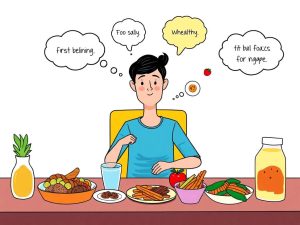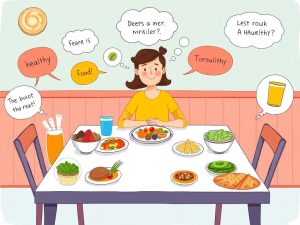The Psychology of Eating: Why We Overeat


Introduction
Overeating is a challenge that many people face, often without fully understanding why it happens. While biological hunger is a straightforward need, our relationship with food is anything but simple. Emotional triggers, environmental influences, and even our evolutionary history play significant roles in why we overeat. Understanding these factors is key to creating healthier eating habits and maintaining a balanced lifestyle.
The Science Behind Overeating
Our bodies are designed to seek food for survival, but modern environments have made it easy to overconsume. High-calorie, processed foods are more accessible than ever, and they’re engineered to be irresistibly appealing. This combination overwhelms our natural hunger signals.
- Biological Factors
- Leptin Resistance: Leptin is the hormone that signals fullness to your brain. When resistance occurs, it disrupts this signal, leading to overeating.
- Dopamine Response: Foods high in sugar and fat stimulate dopamine, the “feel-good” chemical, reinforcing the habit of overeating.
- Evolutionary Influences
- Historically, humans lived in environments where food was scarce, so overeating when food was available was an adaptive behavior. This “feast or famine” mindset can still influence eating habits today.
Emotional Eating: Feeding Feelings
One of the most common reasons people overeat is to cope with emotions. Stress, sadness, boredom, and even happiness can trigger the urge to eat, even when we’re not hungry.
- Stress Eating: Cortisol, the stress hormone, increases appetite, particularly for high-calorie comfort foods.
- Reward Systems: Many people associate food with celebration or comfort, making it a go-to solution for emotional needs.
Environmental Triggers
Our surroundings greatly influence how much and what we eat. Being aware of these triggers can help curb overeating.
- Portion Sizes
- Large portions can distort our perception of appropriate serving sizes, leading us to eat more than necessary.
- Food Availability
- Easy access to snacks and fast food makes it more likely to overeat, especially if healthier options are less convenient.
- Social Settings
- Dining with others can lead to eating more, as conversations and longer meals make it harder to notice fullness.
Strategies to Prevent Overeating
Understanding why we overeat is the first step. Here are practical tips to regain control:
- Practice Mindful Eating
- Focus on your food by eating slowly, savoring each bite, and paying attention to hunger cues.
- Manage Emotional Triggers
- Identify emotions that lead to overeating and find alternative coping strategies, such as journaling, exercising, or meditating.
- Create a Healthy Environment
- Keep healthy snacks accessible and avoid buying high-calorie, low-nutrition foods.
- Portion Control
- Use smaller plates and measure servings to ensure you’re eating appropriate amounts.
- Seek Professional Help
- If overeating feels uncontrollable, consider consulting a therapist or dietitian to address underlying issues.
Conclusion
Overeating is a complex issue influenced by biology, emotions, and environment. By understanding the psychology of eating, you can develop healthier habits and gain control over your relationship with food. Remember, small, consistent changes can lead to significant improvements over time. Start with one strategy today and watch as your relationship with food transforms for the better.


